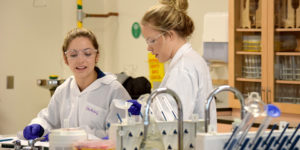Monica Numpaque is getting used to the quiet tranquility of Pembroke, leaving behind the hustle and bustle of a large urban city and the noise and pollution that comes with it, replaced by the sound of birds chirping, the occasional honk of a car horn, clean air and the picturesque beauty of Pembroke’s waterfront.
Numpaque arrived in Canada from Bogota, Colombia, a city of 7.5 million people in April, coming to Pembroke to study in the Environmental Management and Assessment program at Algonquin College’s Waterfront Campus. She was excited to move to Canada for her post-secondary studies, but her expectations have been exceeded.
“I have found that living in a small city like Pembroke has various benefits, including a calm and safe environment. Pembroke is organized and clean, and people have a calm living style, so they are not in a hurry. I appreciate how people are friendly and courteous and welcome you when they see you, wishing you a nice day,” says Numpaque.

Numpaque and her husband are hoping to immigrate to Canada after she completes her co-op placement at the College where she is a science lab monitor, supporting students studying in the Environmental Technician program. She feels fortunate to be working at the College and says the opportunity to participate in a paid co-op placement attracted her to the program.
“I chose the program at Algonquin College since this college is internationally recognized for offering high-quality academic programs. I chose the Pembroke campus because I wanted to study in a peaceful environment surrounded by nature. Furthermore, the curriculum includes courses in a variety of subjects connected to environmental sciences that are both interesting and useful. The field experiences, as well as the Co-op, attracted me to the program,” says Numpaque.
With no vehicle, Numpaque has been getting to know Pembroke on her bike and by walking around the city. Like many newcomers, she is impressed by the vastness of Canada and the wide open spaces that are found in more rural areas. “Canadians are very friendly and kind, they have helped me to adapt to this country and to learn about their interesting culture. Pembroke is a lovely town surrounded by nature, with great spots to ride a bike and participate in water sports. The architecture of its historic homes, churches, and museums make Pembroke a nice place to live.”

During the peak of the COVID-19 pandemic last winter, international students studying in the Environmental Management and Assessment program were able to join the program from their home country, taking the entire first semester of the post-graduate certificate program in a virtual setting. They were required to come to Canada for the spring term to ensure they had the opportunity to participate in many hours of field work.
Learning in Canada’s back country has provided Numpaque with not only a practical learning experience, but also an opportunity to appreciate the country’s natural landscape. “I have enjoyed the field trips offered in the program. We have visited wonderful places full of nature with beautiful landscapes. I have enjoyed as well the sample processing lab where I have learned valuable analytical techniques. The campus location fascinates me since it provides a beautiful view of the Ottawa river and is close to the Waterfront Park, where you can relax and enjoy nature,” says Numpaque.
Recently her husband has found work in Ottawa. The couple is planning to buy a vehicle and begin the process of gaining permanent residency status. Their journey is just starting in Canada. For the next few months, Numpaque will spend many hours in the science lab at the Pembroke Campus gaining valuable work experience in her field, working side-by-side faculty and supporting other students enrolled in environmental science programs.

Numpaque has barely spent any time in the country that she hopes to live and work in for many years, but Pembroke has left her with a great first impression of Canada. Her story is an example of how smaller communities that are welcoming to international students and immigrants can be a landing place for newcomers if they are welcoming and have attractions such as post-secondary schools to grab their attention.
It was Algonquin College that brought Numpaque to Pembroke. It will be the community that will help settle her in the city.
(Posted by Jamie Bramburger, Manager of Community and Student Affairs. Algonquin College’s Pembroke Campus administers the federally funded Local Immigration Partnership in Lanark and Renfrew Counties, a program that helps communities welcome newcomers to their region.)
 Regional college campuses located in smaller rural communities such as the Pembroke Waterfront Campus can play a major leadership role. As these campuses attract more students of culturally diverse backgrounds they create more welcoming communities for new Canadians. A great example is the recent establishment of an
Regional college campuses located in smaller rural communities such as the Pembroke Waterfront Campus can play a major leadership role. As these campuses attract more students of culturally diverse backgrounds they create more welcoming communities for new Canadians. A great example is the recent establishment of an  The Campus wants to be leaders in this effort. Case in point is the celebration of Indigenous culture that has been taking place in the month of March. Powerful learning is taking place as the college embraces the recommendations of the
The Campus wants to be leaders in this effort. Case in point is the celebration of Indigenous culture that has been taking place in the month of March. Powerful learning is taking place as the college embraces the recommendations of the